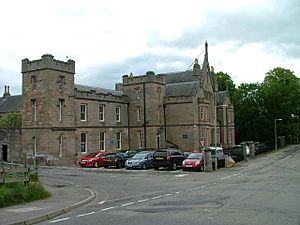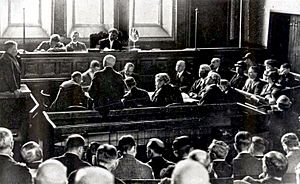Dingwall Sheriff Court facts for kids
Quick facts for kids Dingwall Sheriff Court |
|
|---|---|

Dingwall Sheriff Court
|
|
| Location | Ferry Road, Dingwall |
| Built | 1845 |
| Architect | Thomas Brown II |
| Architectural style(s) | Gothic Revival style |
|
Listed Building – Category B
|
|
| Official name: Dingwall Sheriff Court including former police station, prison, gatepiers and railings, Ferry Road, Dingwall | |
| Designated | 31 August 1983 |
| Reference no. | LB24500 |
| Lua error in Module:Location_map at line 420: attempt to index field 'wikibase' (a nil value). | |
The Dingwall Sheriff Court is an old building in Dingwall, Highland, Scotland. It used to be a place where important legal decisions were made. It also served as the main office for the Ross and Cromarty County Council.
This building is very old, built in 1845. It is now a special "Category B" listed building, which means it's protected because of its history. Since 2015, the building has been changed into homes.
The Story of Dingwall Sheriff Court
For many years, a group called the Ross and Cromarty Commissioners of Supply managed the area. This was from 1667 until 1890. In 1890, the county council was created and took over most of their jobs.
In the early 1840s, the Commissioners decided they needed a new, special building. This building would be used as a courthouse. A courthouse is where judges hear cases and make decisions about the law.
The famous architect Thomas Brown II designed the new building. He used a popular style called Gothic Revival. The building was finished in 1845. It was made from strong stone blocks.
The building had a unique look with nine sections facing Ferry Road. The middle part had an arched entrance and tall, narrow windows. There were also special oriel windows that stick out from the wall. At the back, there was even a prison block. The main courtroom was on the first floor.
Later, in 1865, a police station was added next to the courthouse. It was designed by Andrew Maitland. After a new law in 1889, the Ross and Cromarty County Council moved its offices into this building.
In 1922, a very important investigation took place here. It looked into the deaths of eight people from the Loch Maree Hotel botulism poisoning. The court helped find out what happened.
The county council moved to a new place in the 1930s. The police also moved to a modern station in 1972. The Ferry Road building continued to be a sheriff court until it closed in January 2015. After that, it was turned into homes for people to live in.
See also
 | Aurelia Browder |
 | Nannie Helen Burroughs |
 | Michelle Alexander |


